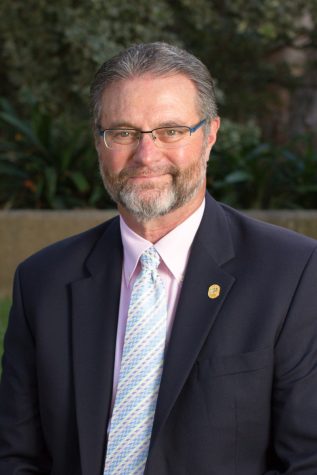The superintendent-president suspended the implementation of a policy strongly criticized by faculty on Wednesday, giving the college time to discuss the implications of the policy.
The controversial Board Policy 3150 was passed by the Board of Trustees on Oct. 12, despite numerous concerns raised about the policy during the meeting by an international student, the Academic Senate President and four other prominent faculty members.

Superintendent-president Anthony Beebe Tuesday, Oct. 3, 2017, outside Business and Communications building.
Following the passage of the policy, Cornelia Alsheimer, president of the faculty association, sent an email to Superintendent-President Anthony Beebe and Trustee Marsha Croninger requesting that the policy be suspended, citing among other things the lack of time the college has had to understand the implications of the policy before it was passed.
Beebe complied with her request, writing in an email to the Academic Senate on Thursday that read: “I am immediately suspending the implementation of Board Policy 3150 indefinitely.”
Beebe clarified what the suspension of the policy’s implementation means, noting that it is his responsibility as Superintendent-President to decide how to implement board policies.
“By suspending the implementation of the policy indefinitely, we get a chance to really figure out what it’s about, what the impacts are and what the issues are,” he said. “Nothing will move forward with the Board policy until then.
“Whatever time we need is the time we’re going to get.”
In an email to The Channels, Trustee Croninger said that she supports Beebe’s decision.
“Dr Beebe’s role is to manage the complex operational aspects of implementing the policy to reach targets. It is his decision how to go about that process,” Croninger said.
However, Priscilla Butler, the Academic Senate President, was not informed by Beebe about the suspension of the policy’s implementation when Beebe first announced his decision. Butler heard about it for the first time when Alsheimer brought it up during the senate’s meeting Wednesday.
“All board policies and actions around them need to come to the senate,” Butler said. “The Faculty Association receiving this information before the Senate is a problem.”
Another problem the Academic Senate has encountered is confusion regarding how it is supposed to proceed in suggesting changes to the controversial policy and board policies in general.
During the Oct. 12 board meeting, Trustee Croninger said to members of the Senate for the first time that the policy— which graphically illustrates the process by which college groups can give feedback on board policies and administrative procedures— is being rewritten by Beebe and Kenley Neufeld, chair of the board policies and administrative procedures committee.
Many members of the faculty are unclear about what this rewriting process means. The primary question is as follows: should the revision process the college has used up until this point to revise Board policies and administrative procedures continue to be used in the interim period between now and the new revision process, or not?
“It’s very difficult to discuss how to move ahead regarding any revisions if we don’t have a shared understanding of how these processes work,” Butler said.
For the time being, Beebe said that the college will continue utilizing the revision process it currently has.
Neufeld agrees that the revision process will largely continue as it has currently been. Though he added that additional revision rules outlined in one of the newly approved board policies will have to be abided by also.
“The process we have will still be followed— but we just have to make sure it’s done in 60 days,” Neufeld said.
He made it clear that any changes made in the rewriting process will for the most part consist of explicitly incorporating the revision rules in the new board policy into the old revision process.
Although the college now has time to deliberate the policy’s details, there is still an atmosphere of unease between the board and the faculty after the contentious Oct. 12 board meeting.
However, Alsheimer said that she is hopeful that the faculty and board can continue to work together to get done the important work the college needs to do moving forward.
“Over the years, we have had such a good working relationship,” she said. “We should get back this, and not have one somewhat miserable Board meeting destroy this good relationship.”








